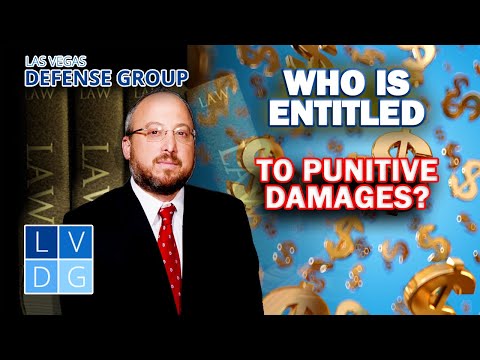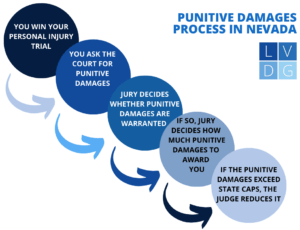
To get punitive damages in Nevada, you must show that the party who caused your injury acted with fraud, malice or oppression. NRS 42.005 allows punitive damages in order to punish the wrongdoer and to set an example that deters dangerous conduct.
When granted, Nevada punitive damages awards are in addition to whatever compensatory damages you receive in a personal injury lawsuit.

To help you better understand Nevada’s law on exemplary damages, our Nevada personal injury lawyers discuss the following, below:
- 1. What is Nevada law regarding punitive damages?
- 2. Is there a cap on punitive damages in Nevada?
- 3. What is the process for collecting the money?
- 4. Are punitive damages available in a labor claim?
- Additional resources

Exemplary awards have caps in most personal injury cases, including for wrongful death.
1. What is Nevada law regarding punitive damages?
Under NRS 42.005, you can receive an award of punitive damages when the defendant’s conduct consists of “fraud,” “malice,” or “oppression.”
Unlike “compensatory damages” (such as medical bills, lost wages and lost earning capacity), exemplary damages have nothing to do with your losses. Instead they serve:
- to punish wrongdoers, and
- as an example to deter others from behaving similarly.
Example: Ned, a nightclub bouncer, punches a patron The patron sues the nightclub for negligent hiring because other patrons had warned the nightclub that Ned was too violent. Since the nightclub consciously disregarded these warnings, the jury awards the patron both compensatory and punitive damages.
Although punitive damages are decided at the very end of a case, you should file your initial complaint (“pleading”) with punitive damages in mind. The complaint should allege behavior justifying punitive damages should you win.
2. Is there a cap on punitive damages in Nevada?
Under NRS 42.005, punitive damage awards in Nevada have a cap of:
- $300,000 if the amount of compensatory damages awarded to you is less than $100,000, or
- Three times the amount of compensatory damages awarded to you if the amount of compensatory damages is $100,000 or more.1
However, there is no limit on the amount of punitive damages you can recover in Nevada if your case involves:
- A manufacturer, distributor or seller of a defective product;
- An insurer who acts in bad faith regarding its obligations to provide insurance coverage;
- A person who violates a state or federal law prohibiting discriminatory housing practices (sometimes),
- Damages or an injury caused by the emission, disposal or spilling of a toxic, radioactive or hazardous material or waste;
- Defamation;2 or
- DUI: A motor vehicle accident caused by a driver who willfully consumed alcohol and/or drugs.3
3. What is the process for collecting the money?
Getting an exemplary award in a Nevada accident or personal injury case is a three-step process:
- Win your trial.
- Ask for exemplary damages.
- The jury (or judge in a bench trial) renders a decision.4
Note that the vast majority of personal injury cases settle out of court. We can often negotiate a settlement big enough that not only covers your losses but also punishes the defendant as well.

A court may grant an exemplary award if the defendant behaved in a particularly egregious way.
3.1. Win your trial
Every cause of action has different elements that you need to prove in order to prevail at trial. For instance, winning a Nevada negligence case requires you proving four elements by a preponderance of the evidence:
- The defendant had a duty of reasonable care;
- The defendant breached this standard of care;
- This breach was the proximate cause of your injuries; and
- These injuries resulted in a financial loss.
“By a preponderance of the evidence” means it is more likely than not that the defendant is liable.
3.2. Ask for exemplary damages
To get an exemplary award, you must specifically request it from the court. Then you have to prove by clear and convincing evidence that the defendant acted with fraud, oppression or malice.
“Clear and convincing evidence” is:
- a higher standard than “by a preponderance of the evidence“, which is the burden of proof in negligence cases, and
- a lower standard than “beyond a reasonable doubt,” which is the burden of proof in criminal cases.
The best way to prove punitive damages are appropriate is to show that the defendant acted intentionally (or at least with a conscious disregard for the well-being of others). This can be done with documents (such as memos or emails) showing the defendant’s intent. It can also be established with testimony.
3.3. The jury (or judge in a bench trial) renders a decision
When a jury is deciding whether the defendant should pay you punitive damages, the jurors are not informed about:
- Nevada’s cap on exemplary awards or
- the defendant’s finances.
Though if the jury decides that punitive damages are warranted, jurors can factor in the defendant’s ability to pay when they calculate the amount of punitive damages to award you.
The judge will then reduce the exemplary award, if necessary, to keep it within the legal limits and the defendant’s ability to pay. The judge can also reduce exemplary awards to make them “proportional” to the compensatory awards.5
If you are awarded punitive damages, the defendant will likely file a motion to reduce or eliminate the punitive damages. The judge will likely deny it unless the punitive damages are:
- unreasonably high,
- disproportional to the compensatory damages, or
- too much for the defendant to afford.
4. Are punitive damages available in a labor claim?
If you are suing an employer for the wrongful acts of an employee, there is an additional hurdle to clear. To recover an exemplary award from an employer who is an individual you must show that:
- The employer knew the employee was a risk to the rights or safety of others;
- The employer authorized or approved the employee’s wrongful act; or
- The employer was personally guilty of oppression, fraud or malice.6
If the employer is a corporation, the employer is not liable for exemplary damages unless:
- An officer, director or managing agent of the corporation committed one of the above acts, and
- That person had authorization to direct or ratify the employee’s conduct on behalf of the corporation.
Note that this limitation on employers does not apply if the case is one against an insurer who acts in bad faith regarding its obligations to provide insurance coverage.7
Additional resources
For more in-depth information, refer to these scholarly articles:
- Punitive Damages Jury Instructions – Model jury instructions in the Ninth Circuit.
- A Punitive Damages Overview: Functions, Problems and Reform – Villanova Law Review.
- Punitive Damages for Deterrence: When and How Much – Alabama Law Review.
- Punitive Damages as Societal Damages – Yale Law Journal.
- Punitive Damages: From Myth to Theory – Iowa Law Review.
Legal references:
- NRS 42.005 (1)(“Fraud” is an intentional misrepresentation, deception or concealment of a material fact known to the defendant and made with the intent to: deprive you of your rights or property or otherwise injure you; “Malice” is conduct which is: intended to injure you, or despicable conduct which is engaged in with a conscious disregard of the rights or safety of others; “Oppression” is despicable conduct that subjects you to cruel and unjust hardship with conscious disregard of your rights; and “Conscious disregard” is the knowledge of the probable harmful consequences of a wrongful act and a willful and deliberate failure to act to avoid those consequences). Smith’s Food & Drug Centers, Inc. v. Bellegarde (1997) 114 Nev. 602, 958 P.2d 1208; Nev. State Educ. Ass’n v. Clark Cty. Educ. Ass’n (2021) 482 P.3d 665; Cain v. Price (2018) 134 Nev. 193, 415 P.3d 25.
- NRS 42.005 (2).
- NRS 42.010. NRS 42.005.
- NRS 42.005 (3).
- NRS 42.005 (4). State Farm Mut. Automobile Ins. Co. v. Campbell (2003) 538 U.S. 408 (“Our jurisprudence and the principles it has now established demonstrate, however, that, in practice, few awards exceeding a single-digit ratio between punitive and compensatory damages, to a significant degree, will satisfy due process.”).
- NRS 42.007 (1).
- NRS 42.007 (2).

